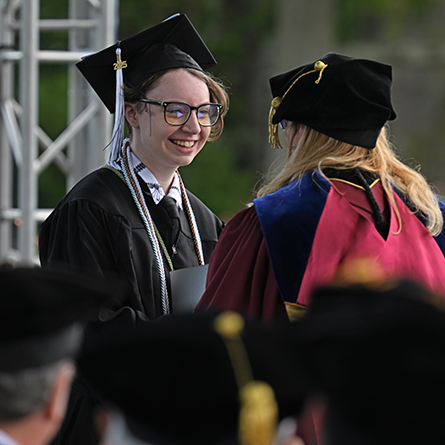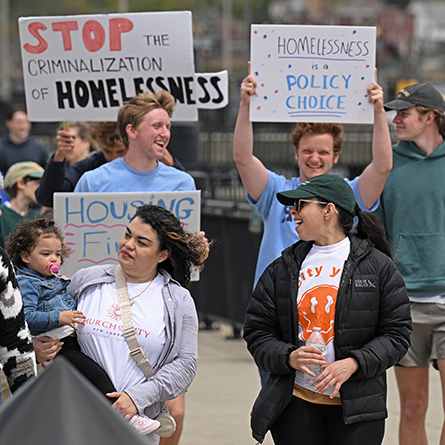
Human rights scholar begins yearlong fellowship at Connecticut College
Binalakshmi Nepram was attending a friend’s wedding one afternoon last March in northeast India, when she received an alarming text message from her mother. Paramilitary forces had entered her parents’ house, demanding Nepram’s whereabouts, but offering neither a warrant nor any explanation.
“My mother obviously knew something was very wrong, so she told me to stay where I was and not come home that night,” Nepram recalled. “The next morning, I took the first flight to New Delhi before I could be detained at the airport, and I met with my lawyers to file a protection plea with the Supreme Court.”
For the past decade, Nepram has been a leading humanitarian and peace advocate in her home state of Manipur and northeast India more broadly. Her advocacy and research has promoted gender equality, women’s’ empowerment and disarmament efforts in a country that faces widespread gun violence and sexual assault. That work has made her a target.
Now, thanks to the Scholar Rescue Fund, an initiative sponsored by the Institute of International Education, and generous support from The Ann Werner Johnson '68 Scholar Rescue Fund, Nepram is spending the next year at Conn conducting research on race, gender and arms proliferation, writing two books and working with students exploring gender studies. Connecticut College is one of the member institutions that has entered into a partnership that hosts scholars from around the world who face the threat of danger in their home countries.
“I am thrilled that through our partnership with the Institute of International Education the College is able to host Bina Nepram as a scholar-in-residence this year,” said Amy Dooling, associate dean of global initiatives and director of the Otto and Fran Walter Commons for Global Study and Engagement. “A deeply committed writer and social activist, Bina brings a wealth of first-hand experience and knowledge about grassroots organizing and advocacy to our campus. I have no doubt she will contribute in significant ways to the intellectual life of our community and we are grateful for the opportunity to support her in the important work she does.”
Nepram’s willingness to confront a system that has fueled perpetual discord for more than half a century, has simultaneously generated hostility from the government as well as the various factions within a volatile independence movement. That separatist conflict and state of martial law has placed Nepram, her colleagues and her fellow citizens of northeast India in the crossfire between government force and insurgent retaliation.
“The government has tried to paint me as a rebel,” Nepram said. “But for me, it’s about finding solutions, not carrying the agenda of any one side.”
A boiling point was reached in March after a 19-year-old man was shot dead in Manipur by the son of a powerful politician during a road rage altercation. The government swept the incident under the rug, and Nepram, with the help of a brave lawyer, fought to get some justice for the victim’s family.
This prompted a chain of events that ultimately made Nepram realize she needed to flee her country a few weeks later.
When she filed a lawsuit in May against the government of Manipur for repeated intimidation of the victim’s parents and Nepram herself, she was advised to leave India immediately by her lawyers. Within 24 hours, Nepram had packed what she could into a red suitcase and boarded a flight to the United States. She hasn’t been home since.
“The reason I came here, is because I’m not ready to die like Berta Cáceres did,” Nepram explained, referencing the Honduran activist who was assassinated in 2016. “It was really tough. I had to leave everything behind.”
Today, a dozen armed security agents guard her parents’ home, and Nepram has been granted lifetime protection by the Supreme Court of India, providing her a security detail whenever she is in her home country.
Nepram’s family is not unfamiliar with the consequences of the region’s bloodshed. In 1997, while returning home from Badminton practice, her teenaged niece was killed when she stepped on a bomb laid by insurgents that had been intended for some politicians. This personal tragedy was a pivotal event in motivating what has become Nepram’s life work as a human rights and peace advocate.
Nepram, who has been recognized internationally with a variety of prestigious peace awards for her grassroots work and the organizations she has founded, including the Manipur Women Gun Survivors Network and the Control Arms Foundation of India, said despite her frustration with how slow progress is, she remains optimistic.
“What gives me hope is that I still see examples of idealism at places like the U.N.,” Nepram said. “There are nations who believe in the values we believe in, and we’ll continue to work together.”
Nepram said she has declined invitations to run for political office, because she feels she can be more effective on the outside of the system, and doesn’t intend to slow down her activism anytime soon. In the meantime, she’s grateful for the breathing space Conn and the Scholar Rescue Fund have provided.
“For me, every day is precious, and I take every day as a day that will never come back,” Nepram said. “It’s such a wonderful luxury to be on this beautiful campus for a year with the faculty and students and the warmth I’ve been shown here. The peace I get from being here is immense.”

